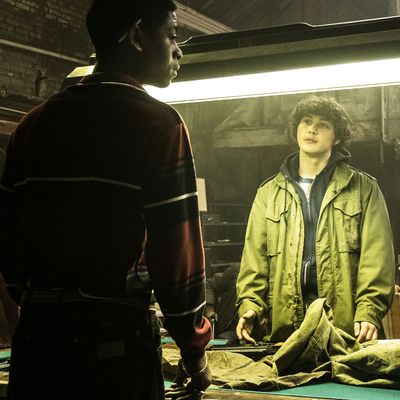
There’s something strangely uninvolving about White Boy Rick, despite all its claims to be a sensational true story. Director Yann Demange’s film contains all the elements of a story that is positioning itself to say something important about America — firearms, racial divides, a crumbling, crime-ridden 1980s Detroit. But the script by Andy Weiss, Logan Miller, and Noah Miller often feels like it’s consistently off by a beat, falling short of what it’s trying to sell emotionally at every turn.
The extraordinary circumstances of Rick Wershe, a teenage FBI informant turned teenage drug lord, never feel quite extraordinary on the screen, partially due to the critically underplayed performance of Richie Merritt in the title role. For a kid with so much on his plate, Merritt never quite gives a sense of what’s going on in Rick’s head. We’re left to hear it from his dad, Rick Sr. (Matthew McConaughey) who, not uncoincidentally, begins to feel like the main character. Rick Sr. is a black-market firearms dealer when the film opens in 1984, specializing in illegal silencers for automatic weapons. His son’s role as his errand boy brings him in contact with local gangster Johnny “Lil Man” Curry, whose drug operation has ties to the police department and the mayor. When Rick Sr. refuses to play ball with an FBI sting, Rick Jr. steps up to the plate.
At this point, director Yann Demange hasn’t done enough to establish who Rick is — how young he is, how strong his moral compass is — nothing. We know he’s loyal to his dad and cares for his drug-addicted sister Dawn (Bel Powley), but aside from that, we don’t know how to feel about his new gig, his testy relationship with the FBI agents (Jennifer Jason Leigh and Rory Cochrane), or his growing friendship with Johnny’s crew. He has fun shooting rats with some of younger kids, and has some moments of jubilation at Johnny’s wedding to the mayor’s daughter, but the relationship between him and the people he’s supposedly spying on is murky at best — is he like a brother, making his betrayal even colder? Or is he an outsider, trying to win the trust of Johnny’s circle while simultaneously eroding it? Neither scenario, or anything in between, is articulated compellingly.
Rick’s work for the FBI includes dealing himself, with PD-issued crack, supplied by narcotics detective Jackson (Brian Tyree Henry) — getting him locked into a way of life that he finds he can’t abandon once the bureau has made their arrests and has no more use for him. The final act of the film, with Richie as a young cocaine kingpin at the ripe age of 17, conveniently fast-forwards through the journey from the desperate poverty father and son are living in in the first two thirds of the film. Perhaps it would be too much methodical drudgery to get through, but the result is that once again the screenwriters have skipped over another opportunity to get us to like or root for Rick — or connect with him in any way. When everything ends about as happily as one would expect, a vague question mark of a moral forms over the film. Throughout Rick’s hijinks, the black characters in the film have reminded him that he is held to a different standard and faces different consequences for his actions because of his race. So, with no real character work or compelling performance moments from Merritt, what are we to make of Rick? A kid who had it rough, but not as rough as his peers? A kid who ruined people’s lives, but also his own, more or less passively? White Boy Rick is better on paper than on the screen, but it’s the bland filmmaking that dooms it far more than a lack of story to work with.

